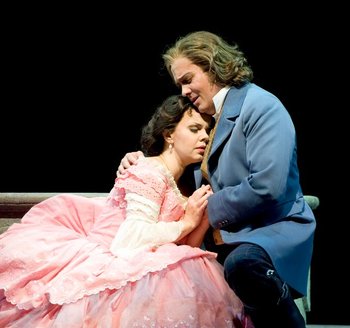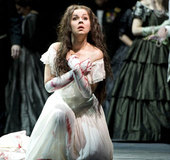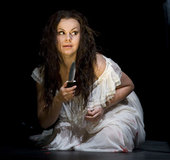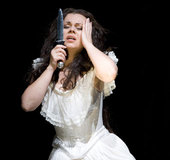 The first of several heart-stopping moments in Seattle Opera's dazzling new production of Gaetano Donizetti's Lucia di Lammermoor comes in the first act. Lucia, sung with crystalline brilliance by the Polish soprano Aleksandra Kurzak, entwines her limbs with Edgardo's (tenor William Burden) as they pledge eternal love. In the audience, you can't help but fall in love with the singers, even though you know there's trouble ahead, big trouble.
The first of several heart-stopping moments in Seattle Opera's dazzling new production of Gaetano Donizetti's Lucia di Lammermoor comes in the first act. Lucia, sung with crystalline brilliance by the Polish soprano Aleksandra Kurzak, entwines her limbs with Edgardo's (tenor William Burden) as they pledge eternal love. In the audience, you can't help but fall in love with the singers, even though you know there's trouble ahead, big trouble.
Meanwhile, the music keeps on coming. When Lucia premiered in 1835, Donizetti was the king of Italian opera composers, with Rossini retired, Bellini dead, and Verdi still on the horizon. For continental audiences of the 19th century, the Scotland of Sir Walter Scott's romantic novels was a wild and woolly emotional frontier of stormy landscapes dotted with rugged cliffside castles and populated by endlessly warring clans. (For all that, the setting of this Lucia is more Italian hill-town than craggy Lammermuir.) In the second act, there's a brilliant sextet in which the principle characters express their individual perspectives on the action (joy, despair, trepidation, excitement, etc.) in what's become an operatic clické, but here it's staged with such musical conviction that you realize "Aha! This is where those silly parodies (Bugs Bunny, Three Stooges), originate! Now they make sense!"
Then, in the third act, comes the hair-curling mad scene, which could be nothing but coloratura flash. With the right performers (Maria Callas, Dame Joan Sutherland), it becomes a gut-wrenching tour de force. (The opening night performance was dedicated to Sutherland's memory.) Kurzak is technically perfect and emotionally convincing.
The Seattle Opera chorus periodically fills Robert Dahlstrom's multi-tiered set with lavish costumes (by Deborah Trout) and rousing voices (prepared by Beth Kirchhoff). In the pit, the Neapolitan conductor Bruno Cinquegrani, a Donizetti specialist, leads the orchestra with assurance and verve.
It's the fourth time now that McCaw audiences have heard Burden: shipwrecked in Iphigenia auf Tauris, shirtless in Pearl Fishers, in dress whites as Amelia's father, and now as a love-struck Scotsman. He becomes more assured and muically confident with each appearance. If he kept his mind on his mission (avenging his family, murdered by Lucia's older brother) there'd be no opera. If Lucia refused hers (to marry her brother's benefactor), there'd be no opera. Instead, Lucia kills her husband,goes mad and kills herself. Burden has the unenviable task of following one of the most famous scenes in opera with an anguished aria of his own; he pulls it off with aplomb.
Kurzak, an immensely talented and accomplished lyric soprano whose roles to date have stopped just short of madness, sings her first Lucia. She's entirely credible as a teenage Lucia (clowning around a fountain) who quickly gets in over her head as a pawn in story's medieval Scottish politics. She lands the thrilling high notes but she's almost too cute for her hysteria to be absorbed as tragedy. Genuine madness, you think, requires greater maturity, greater sense of loss than teenage poutiness:
Act One: @LuciaLamm Edgardo the coolest, love forever, but bro disapproves
Act Two: @LuciaLamm Marry to save famiily, WTF? Arturo better not eff w me
Act Three: @LuciaLamm OMG stabbed Arturo blood everywhere. Losing it
And yet, and yet. What makes Lucia such a pleasure is the seamless collaboration of international talents (Polish, Croatian, Italian, Israeli, Spanish, to name just the froeign-born artists) in the service of music written close to 200 years ago, music that gives a depth of meaning to a timeless story, performed by singers who give it emotional depth.
Sopranos (and the occasional mezzo) go mad with frightening regularity in opera; on this same stage we've heard Elvira in I Puritani, the title character in Amelia, Lady Macbeth in Macbeth (more histrionics), and Azucena in Il Trovatore
So when Kurzak's Lucia descends the staircase of the Piranesi-inspired set clutching the bloody veil of her wedding gown, she's no longer a little girl overwhelmed by family politics, she's no longer a "canary" but a woman with spectacular vocal gifts. Her madness, transcending demented confusion, becomes an expression of victory, of moral clarity.
Un armonia celeste, di, non ascolti?
That celestial harmony, don't you hear it?
What we learn from Lucia is an all-too-familiar lesson: sanity is no substitute for honesty, madness no impediment to truth.



Seattle Opera presents Lucia di Lammermoor at McCaw Hall through Oct. 30th. Tickets $25 to $191. Reservations online or by calling 206-389-7676.
Seattle Opera photos © Rosarii Lynch
Leave a comment